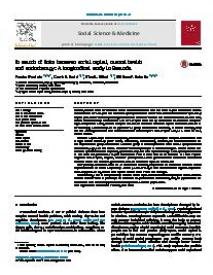In search of links between social capital, mental health and sociotherapy: a longitudinal study in Rwanda
To date, reviews show inconclusive results on the association between social capital and mental health. Evidence that social capital can intentionally be promoted is also scarce. Promotion of social capital may impact post-conflict recovery through both increased social cohesion and better mental health. However, studies on community interventions and social capital have mostly relied on cross-sectional study designs. We present a longitudinal study in Rwanda on the effect on social capital and mental health of sociotherapy, a community-based psychosocial group intervention consisting of fifteen weekly group sessions. We hypothesized that the intervention would impact social capital and, as a result of that,
mental health. We used a quasi-experimental study design with measurement points pre- and post-intervention and at eight months follow-up (2007e2008). Considering sex and living situation, we selected 100 adults for our experimental group. We formed a control group of 100 respondents with similar symptom score distribution, age, and sex from a random community sample in the same region. Mental health was assessed by use of the Self Reporting Questionnaire, and social capital through a locally adapted version
of the short Adapted Social Capital Assessment Tool. It measures three elements of social capital: cognitive social capital, support, and civic participation. Latent growth models were used to examine whether effects of sociotherapy on mental health and social capital were related. Civic participation increased with 7% in the intervention group versus 2% in controls; mental health improved with 10% versus 5% (both: p < 0.001). Linear changes over time were not significantly correlated.Support and cognitive social capital did not show consistent changes.These findings hint at the possibility to foster social capital and simultaneously impact mental health. Further identification of pathways of influence may contribute to the designing of psychosocial interventions that effectively promote recovery in war-affected populations. Trial registration: Nederlands Trial Register 1120.
Geachte bezoeker,
De informatie die u nu opvraagt, kan door psychotraumanet niet aan u worden getoond. Dit kan verschillende redenen hebben,
waarvan (bescherming van het) auteursrecht de meeste voorkomende is. Wanneer het mogelijk is om u door te verwijzen naar de bron
van deze informatie, dan ziet u hier onder een link naar die plek.
Als er geen link staat, kunt u contact opnemen met de bibliotheek,
die u verder op weg kan helpen.
Met vriendelijke groet,
Het psychotraumanet-team.
Reference:
Femke Verduin, Geert E. Smid, Tim R. Wind, Willem F. Scholte | 2014
In: Social Science & Medicine, ISSN 0277-9536 | 121 | 1-9
Rubriek: Post-Conflict Social Capital. Epub ahead of print
In: Social Science & Medicine, ISSN 0277-9536 | 121 | 1-9
Rubriek: Post-Conflict Social Capital. Epub ahead of print
Keywords:
Communities, Community Resilience, Intellectuals, Interventions, Mental health, Post-Conflict Social Capital, Recovery, Rwandans, Social Capital, Social Support, Sociotherapy
Affiliation author(s):


